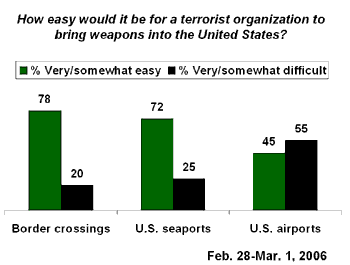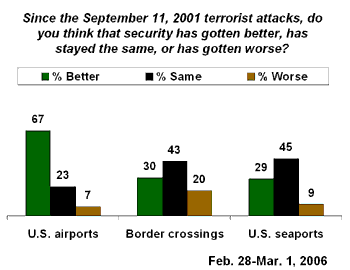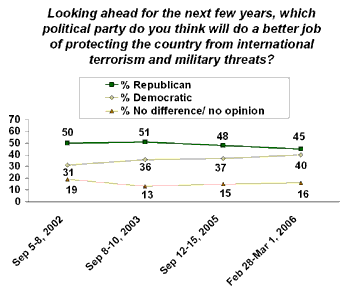Gallup
by Joseph Carroll
March 9, 2006
GALLUP NEWS SERVICE
PRINCETON, NJ -- More than 7 in 10 Americans say it would be easy for a terrorist organization to bring weapons into the United States through U.S. seaports or border crossings between the U.S. and Canada or Mexico, according to a recent CNN/USA Today/Gallup poll. Fewer than half of Americans say it would be easy to bring weapons into the country through airports. Since the 9/11 terrorist attacks, most Americans say security at airports has gotten better, while only about 3 in 10 say security is better at seaports or border crossings.
Americans continue to be more likely to say the Republican Party rather than the Democratic Party would do a better job protecting the country from international terrorism and military threats. However, the Republican advantage has been cut in half over the past six months, continuing a trend that Gallup has measured over the past few years.
Ease of Bringing Weapons Into the United States
The recent deal approved by the Bush administration to allow a United Arab Emirates state-owned company to control operations in six U.S. seaports has raised the issue of security concerns at seaports in the country.
According to the Feb. 28-Mar. 1 poll, 78% of Americans think it would be either "very" or "somewhat" easy for terrorists to bring weapons into the country through border crossings, and 72% express the same view about seaports. By contrast, only 45% of Americans say it would be easy to bring weapons into the country through airports.

Democrats (including independents who lean toward the Democratic Party) are more likely than Republicans (including independents who lean to the Republican Party) to say it would be easy for terrorists to bring weapons into the country through any of the three places. The largest partisan difference involves weapons coming into the country through seaports, with 80% of Democrats saying this would be easy versus 61% of Republicans. Democrats are also more likely than Republicans to oppose the deal to sell operations at several seaports to the Dubai company, though a majority of both party groups opposes this sale.
|
Ease of Bringing Weapons into the United
States |
||
|
Republicans (including those independents who lean to the Republican Party) |
Democrats (including those independents who lean to the Democratic Party) |
|
|
% |
% |
|
|
U.S.seaports |
|
|
|
Easy |
61 |
80 |
|
Difficult |
37 |
16 |
|
|
|
|
|
U.S.airports |
|
|
|
Easy |
32 |
53 |
|
Difficult |
67 |
47 |
|
|
|
|
|
Border crossings |
|
|
|
Easy |
74 |
80 |
|
Difficult |
23 |
18 |
Security Improvements Since 9/11?
Clearly, the government has placed a high priority on keeping the United States safe from terrorism since the Sept. 11, 2001 terrorist attacks, and one of the most notable actions is increased security procedures at airports.
The poll finds that 67% of Americans say security at U.S. airports has gotten better since 9/11, including 34% who say security has gotten "a lot better." Americans are less likely to believe security has improved at border crossings (30%) or seaports (29%). It is unclear whether Americans are more positive about airport security due to personal experience, since air travel is fairly common, while relatively few Americans have direct experience with what happens at border crossings or seaports.
Americans, however, do not believe security at these places has gotten worse; rather, a plurality of adults nationwide say security at border crossings (43%) and seaports (45%) has "stayed about the same."

Republicans and Democrats differ most significantly in their views of security at seaports. Forty percent of Republicans say security at seaports has gotten better, compared with 21% of Democrats. The partisan gap is smaller in the evaluation of airports, with 74% of Republicans and 62% of Democrats saying security is better there. Democrats are slightly more inclined than Republicans to say security is better at border crossings, 32% vs. 26%.
|
Security Better, Same, or Worse Since
9/11 |
||
|
Republicans (including those independents who lean to the Republican Party) |
Democrats (including those independents who lean to the Democratic Party) |
|
|
% |
% |
|
|
U.S.seaports |
|
|
|
Better |
40 |
21 |
|
Same |
38 |
50 |
|
Worse |
5 |
13 |
|
|
|
|
|
U.S.airports |
|
|
|
Better |
74 |
62 |
|
Same |
20 |
25 |
|
Worse |
5 |
8 |
|
|
|
|
|
Border crossings |
|
|
|
Better |
26 |
32 |
|
Same |
48 |
40 |
|
Worse |
20 |
20 |
Party to Better Protect Country From Terrorism?
By a 45%-to-40% margin, Americans say the Republican Party would do a better job than the Democratic Party in protecting the country from international terrorism and military threats. This is the smallest difference between the parties that Gallup has measured in recent years, and the gap between the parties has shrunk each time Gallup asked the question.

In 2002, there was a 19-point gap, with 50% of Americans choosing the Republican Party over the Democratic Party for handling terrorism and military threats. By 2005, the gap had decreased to 11 points, with 48% preferring the Republicans and 37% the Democrats. That gap has been cut in half in just six months, perhaps due in part to the proposed Dubai deal.
Survey Methods
Results are based on telephone interviews with 1,020 national adults, aged 18 and older, conducted Feb. 28-Mar. 1, 2006. For results based on the total sample of national adults, one can say with 95% confidence that the maximum margin of sampling error is ±3 percentage points.
For results based on the 493 national adults in the Form A half-sample and 527 national adults in the Form B half-sample, the maximum margins of sampling error are ±5 percentage points.
In addition to sampling error, question wording and practical difficulties in conducting surveys can introduce error or bias into the findings of public opinion polls.
Commentary: